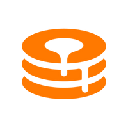-
 Bitcoin
Bitcoin $84,258.9872
0.35% -
 Ethereum
Ethereum $1,590.5943
1.14% -
 Tether USDt
Tether USDt $0.9998
-0.02% -
 XRP
XRP $2.0990
1.26% -
 BNB
BNB $587.2456
1.30% -
 Solana
Solana $132.5296
6.11% -
 USDC
USDC $0.9999
0.00% -
 TRON
TRON $0.2483
-2.37% -
 Dogecoin
Dogecoin $0.1557
1.96% -
 Cardano
Cardano $0.6199
2.68% -
 UNUS SED LEO
UNUS SED LEO $9.1185
-2.93% -
 Chainlink
Chainlink $12.4572
2.80% -
 Avalanche
Avalanche $19.2046
1.97% -
 Toncoin
Toncoin $2.9568
3.52% -
 Stellar
Stellar $0.2397
2.14% -
 Shiba Inu
Shiba Inu $0.0...01181
1.81% -
 Sui
Sui $2.0961
0.90% -
 Hedera
Hedera $0.1602
2.15% -
 Bitcoin Cash
Bitcoin Cash $330.4313
4.06% -
 Polkadot
Polkadot $3.6278
3.32% -
 Litecoin
Litecoin $74.9638
1.65% -
 Hyperliquid
Hyperliquid $16.4916
8.27% -
 Dai
Dai $0.9999
-0.01% -
 Bitget Token
Bitget Token $4.3499
0.87% -
 Ethena USDe
Ethena USDe $0.9990
-0.03% -
 Pi
Pi $0.6068
-1.04% -
 Monero
Monero $216.4766
0.12% -
 Uniswap
Uniswap $5.1795
0.94% -
 Pepe
Pepe $0.0...07203
1.55% -
 OKB
OKB $50.4898
-2.39%
What role does Oracle play in blockchain? Why does DeFi need it?
Oracles are vital for DeFi, providing smart contracts with real-world data like prices, enabling functions in lending, DEXs, and stablecoins.
Apr 07, 2025 at 03:07 pm
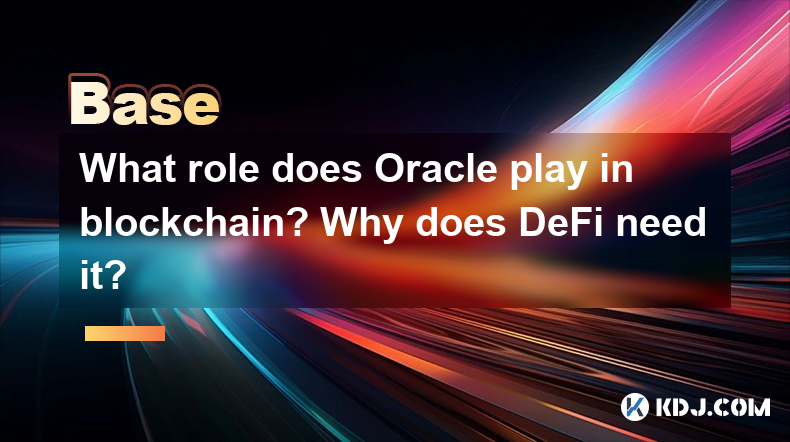
Oracle plays a crucial role in the blockchain ecosystem, particularly in the realm of decentralized finance (DeFi). An Oracle is a service that provides smart contracts with external data, enabling them to interact with the real world. This is essential because blockchains, by design, are isolated systems that cannot access off-chain data directly. Without Oracles, smart contracts would be limited to the data within their own network, severely restricting their functionality and utility.
What is an Oracle in Blockchain?
An Oracle is essentially a bridge between the blockchain and the external world. It fetches, verifies, and delivers external data to smart contracts on the blockchain. This data can include anything from price feeds, weather information, to the outcome of events. By providing this external data, Oracles enable smart contracts to execute based on real-world conditions, making them more versatile and powerful.
How Do Oracles Work?
Oracles operate by connecting to various data sources outside the blockchain. They collect this data, process it, and then transmit it to the blockchain in a format that smart contracts can use. The process involves several steps:
- Data Collection: Oracles gather data from multiple sources to ensure accuracy and reliability.
- Data Verification: The collected data is verified to prevent manipulation and ensure its integrity.
- Data Transmission: Once verified, the data is sent to the blockchain where it can be accessed by smart contracts.
- Smart Contract Execution: The smart contract uses the data to execute its programmed logic, such as triggering a payment or adjusting a parameter.
Why is Oracle Important for DeFi?
DeFi, or decentralized finance, relies heavily on Oracles to function effectively. DeFi applications, such as lending platforms, decentralized exchanges, and stablecoins, need real-time data to operate. For instance, a lending platform needs to know the current price of collateral assets to determine loan-to-value ratios and manage risk. Without Oracles, these platforms would not be able to access this critical data, rendering them ineffective.
Examples of Oracle Use in DeFi
Several DeFi applications demonstrate the importance of Oracles:
- Decentralized Exchanges (DEXs): DEXs use Oracles to fetch real-time price data for trading pairs. This ensures that trades are executed at fair market prices.
- Lending Platforms: Platforms like Aave and Compound use Oracles to monitor the value of collateral assets. If the value drops below a certain threshold, the platform can liquidate the collateral to protect lenders.
- Stablecoins: Stablecoins like DAI use Oracles to maintain their peg to a fiat currency. The Oracle provides the current price of the collateral, allowing the system to adjust the supply of the stablecoin accordingly.
Challenges and Solutions with Oracles
While Oracles are essential, they also present challenges, particularly around data accuracy and security. If an Oracle provides incorrect data, it can lead to significant issues, such as incorrect loan liquidations or mispriced trades. To address these challenges, several solutions have been developed:
- Decentralized Oracles: Instead of relying on a single Oracle, decentralized Oracles aggregate data from multiple sources. This reduces the risk of manipulation and increases data reliability.
- Cryptographic Verification: Some Oracles use cryptographic techniques to verify the integrity of the data they provide. This adds an extra layer of security and trust.
- Incentive Mechanisms: Some Oracle networks use incentive mechanisms to encourage honest reporting. Participants are rewarded for providing accurate data and penalized for providing false information.
How to Integrate an Oracle into a Smart Contract
Integrating an Oracle into a smart contract involves several steps:
- Choose an Oracle Service: Select a reputable Oracle service that meets your needs. Popular options include Chainlink, Band Protocol, and Tellor.
- Set Up the Oracle Contract: Deploy the Oracle contract on the blockchain. This contract will interact with the Oracle service to fetch data.
- Modify the Smart Contract: Update your smart contract to call the Oracle contract and retrieve the necessary data. This typically involves adding a function that requests data from the Oracle.
- Handle Data: Once the Oracle provides the data, your smart contract needs to process it and execute the appropriate logic. This might involve checking conditions and triggering actions based on the data received.
Frequently Asked Questions
Q: Can Oracles be used for purposes other than DeFi?
A: Yes, Oracles can be used in various other applications within the blockchain ecosystem. For example, they can be used in supply chain management to track the status of goods, in gaming to provide random numbers, or in insurance to verify claims based on real-world events.
Q: How do Oracles ensure the privacy of the data they handle?
A: Oracles can use various techniques to ensure data privacy, such as encryption and zero-knowledge proofs. These methods allow Oracles to provide data to smart contracts without revealing sensitive information.
Q: What happens if an Oracle goes offline or fails to provide data?
A: To mitigate the risk of Oracle failure, many systems use multiple Oracles and implement fallback mechanisms. If one Oracle goes offline, the system can switch to another Oracle or use a pre-defined default value until the primary Oracle comes back online.
Q: Are there any costs associated with using Oracles?
A: Yes, using Oracles typically incurs costs, which can include fees for data retrieval, processing, and transmission. These costs vary depending on the Oracle service and the complexity of the data required.
Disclaimer:info@kdj.com
The information provided is not trading advice. kdj.com does not assume any responsibility for any investments made based on the information provided in this article. Cryptocurrencies are highly volatile and it is highly recommended that you invest with caution after thorough research!
If you believe that the content used on this website infringes your copyright, please contact us immediately (info@kdj.com) and we will delete it promptly.
- Kaspa (KAS) Price Prediction Hints at Accumulation Before Potential Surge
- 2025-04-17 22:15:13
- FET Price Prediction: Artificial Superintelligence Alliance (FET) Cryptocurrency Rebounds 10%
- 2025-04-17 22:15:13
- U.S. President Donald Trump Slammed Fed Chair Jerome Powell
- 2025-04-17 22:15:12
- Running a laundromat can't be as "easy" as potential investors may believe it is
- 2025-04-17 22:15:12
- BlockDAG (BDAG) Presale Explosion and Mobile Mining Powerhouse
- 2025-04-17 22:05:12
- Solana (SOL) Price Prediction: Eyes on $180 as Structure Turns Bullish
- 2025-04-17 22:05:12
Related knowledge
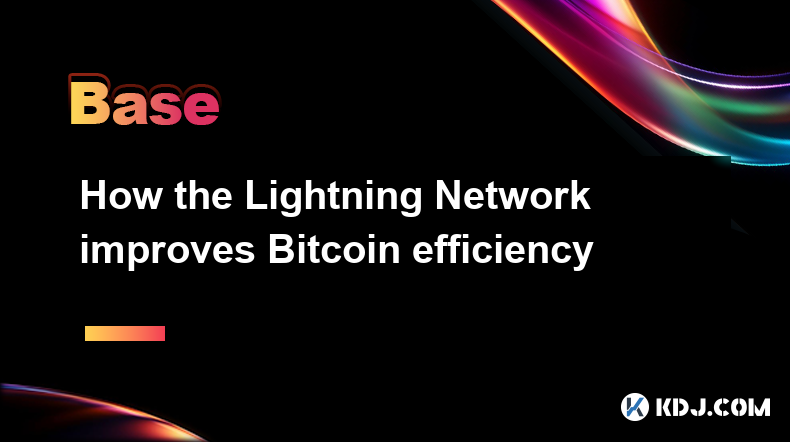
How the Lightning Network improves Bitcoin efficiency
Apr 17,2025 at 08:56pm
The Lightning Network represents a significant advancement in the Bitcoin ecosystem, aiming to address some of the most pressing issues related to transaction speed and cost. By enabling off-chain transactions, the Lightning Network drastically improves Bitcoin's efficiency, allowing for faster and cheaper transactions. This article will explore how the...

Analysis of the KYC process of cryptocurrency exchanges
Apr 17,2025 at 05:07pm
The Know Your Customer (KYC) process is a critical component in the operations of cryptocurrency exchanges. It serves as a regulatory measure to prevent fraud, money laundering, and other illicit activities. KYC procedures are designed to verify the identity of users and ensure compliance with financial regulations. This article delves into the various ...

What does Floor Price mean in the NFT market
Apr 17,2025 at 12:42am
The term Floor Price is a critical concept within the NFT (Non-Fungible Token) market, serving as a key indicator for both buyers and sellers. In essence, the floor price represents the lowest price at which an NFT from a particular collection is currently listed for sale on a marketplace. This price point is crucial for understanding the perceived valu...
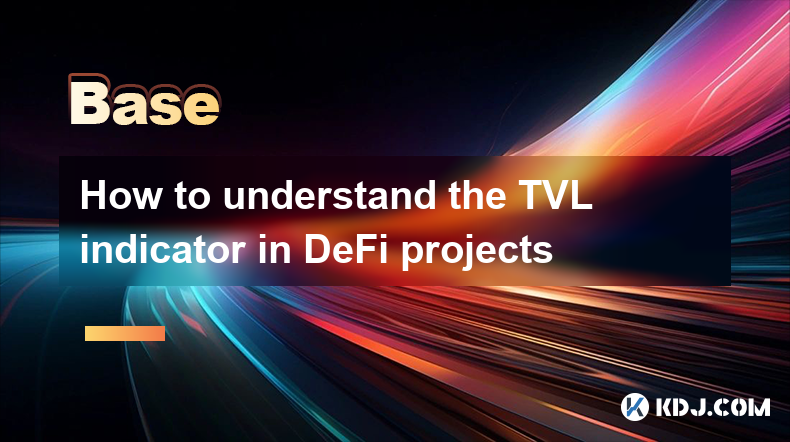
How to understand the TVL indicator in DeFi projects
Apr 17,2025 at 03:28pm
Understanding the TVL indicator in DeFi projects is crucial for investors and enthusiasts looking to gauge the health and popularity of decentralized finance platforms. TVL, or Total Value Locked, represents the total amount of assets that are currently staked or locked in a DeFi protocol. This metric serves as a barometer for the trust and interest tha...
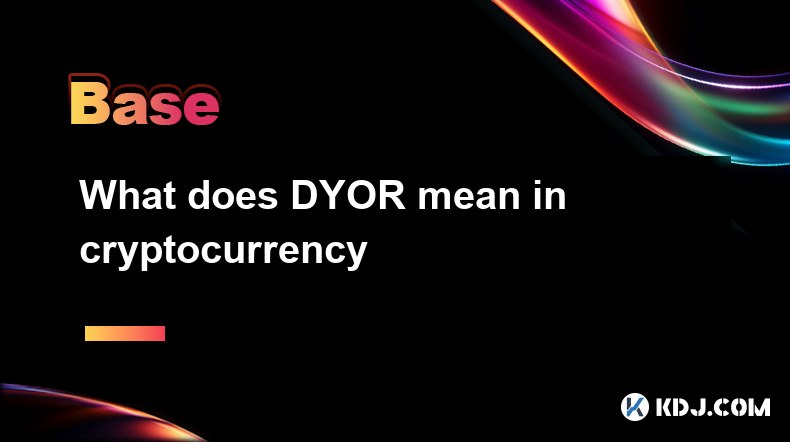
What does DYOR mean in cryptocurrency
Apr 17,2025 at 03:00pm
DYOR, or 'Do Your Own Research,' is a crucial mantra in the cryptocurrency community. It emphasizes the importance of individuals conducting their own thorough investigations before making any investment decisions. In the fast-paced and often volatile world of cryptocurrencies, relying solely on others' advice or the hype surrounding a particular coin c...
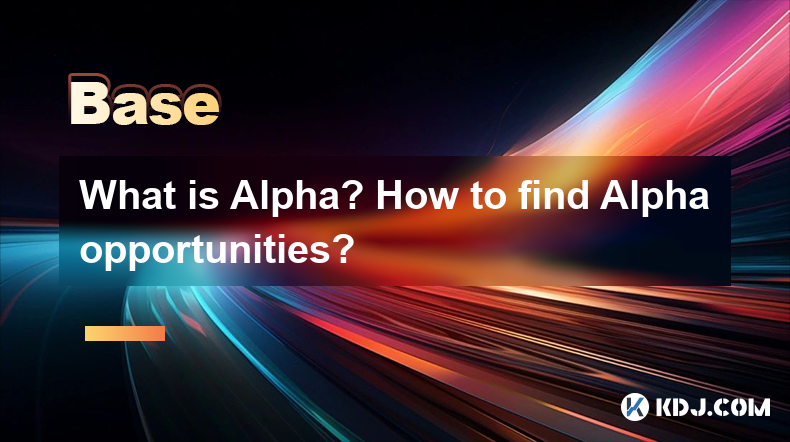
What is Alpha? How to find Alpha opportunities?
Apr 16,2025 at 12:42pm
What is Alpha?Alpha is a term widely used in the financial world, including the cryptocurrency market, to describe the ability of an investment to outperform a benchmark. In the context of cryptocurrencies, alpha refers to the excess return an investor achieves over the market's average return. For example, if the overall crypto market grows by 10% in a...

How the Lightning Network improves Bitcoin efficiency
Apr 17,2025 at 08:56pm
The Lightning Network represents a significant advancement in the Bitcoin ecosystem, aiming to address some of the most pressing issues related to transaction speed and cost. By enabling off-chain transactions, the Lightning Network drastically improves Bitcoin's efficiency, allowing for faster and cheaper transactions. This article will explore how the...

Analysis of the KYC process of cryptocurrency exchanges
Apr 17,2025 at 05:07pm
The Know Your Customer (KYC) process is a critical component in the operations of cryptocurrency exchanges. It serves as a regulatory measure to prevent fraud, money laundering, and other illicit activities. KYC procedures are designed to verify the identity of users and ensure compliance with financial regulations. This article delves into the various ...

What does Floor Price mean in the NFT market
Apr 17,2025 at 12:42am
The term Floor Price is a critical concept within the NFT (Non-Fungible Token) market, serving as a key indicator for both buyers and sellers. In essence, the floor price represents the lowest price at which an NFT from a particular collection is currently listed for sale on a marketplace. This price point is crucial for understanding the perceived valu...

How to understand the TVL indicator in DeFi projects
Apr 17,2025 at 03:28pm
Understanding the TVL indicator in DeFi projects is crucial for investors and enthusiasts looking to gauge the health and popularity of decentralized finance platforms. TVL, or Total Value Locked, represents the total amount of assets that are currently staked or locked in a DeFi protocol. This metric serves as a barometer for the trust and interest tha...

What does DYOR mean in cryptocurrency
Apr 17,2025 at 03:00pm
DYOR, or 'Do Your Own Research,' is a crucial mantra in the cryptocurrency community. It emphasizes the importance of individuals conducting their own thorough investigations before making any investment decisions. In the fast-paced and often volatile world of cryptocurrencies, relying solely on others' advice or the hype surrounding a particular coin c...

What is Alpha? How to find Alpha opportunities?
Apr 16,2025 at 12:42pm
What is Alpha?Alpha is a term widely used in the financial world, including the cryptocurrency market, to describe the ability of an investment to outperform a benchmark. In the context of cryptocurrencies, alpha refers to the excess return an investor achieves over the market's average return. For example, if the overall crypto market grows by 10% in a...
See all articles


















































































